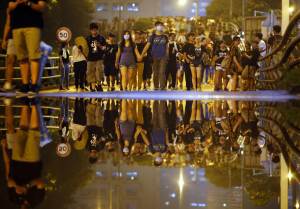HONG KONG (AP) — Pro-democracy protesters demanded that Hong Kong's top leader meet with them, threatening wider actions if he did not, after he said Tuesday that China would not budge in its decision to limit voting reforms in the Asian financial hub.
Chinese President Xi Jinping, who has taken a hard line against any perceived threat to the Communist Party's hold on power, meanwhile vowed in a National Day speech to "steadfastly safeguard" Hong Kong's prosperity and stability. He said Beijing believes Hong Kong will "create an even better future in the big family of the motherland."
China's government has condemned the student-led protests as illegal, though so far it has not overtly intervened, leaving Hong Kong's semi-autonomous government to handle the crisis. But Chief Executive Leung Chun-ying's rejection of the student demands dashed hopes for a quick resolution of the five-day standoff that has blocked city streets, forcing some schools and offices to close.
Leung's statement drew a defiant response from the students.
"If Leung Chun-ying doesn't come out to Civic Square before midnight ... then I believe inevitably more people will come out onto the streets," said Alex Chow, secretary general of the Hong Kong Federation of Students, the organizer of the university class boycotts that led to the street protests.
Chow said the students were considering various options, including widening the protests, pushing for a labor strike and possibly occupying a government building.
Despite the hardening rhetoric from both sides, the mood Tuesday night as the crowds of protesters swelled was festive. Few police were evident, and those who were appeared relaxed.
View gallery

Protesters walk along a street as they block an area near the government headquarters building in Ho …
Both sides appeared to be waiting out the standoff, as police continued the light-handed approach to the protests they adopted after their use of tear gas and pepper spray over the weekend failed to drive out tens of thousands of people occupying streets near the government headquarters. The sit-ins instead spread to the financial district and other areas.
A brief cloudburst Tuesday cooled the air, seeming to energize the protesters, a group of whom shouted "Jiayou," or "Keep it up," and waved their cellphones with bright LED flashlights sparkling in the dark.
The crowd had plenty of umbrellas and rain capes on hand, having stockpiled them as a defense in case police might again deploy tear gas and pepper spray.
"We are not afraid of riot police, we are not afraid of tear gas, we are not afraid of pepper spray. We will not leave until Leung Chun-ying resigns. We will not give up, we will persevere until the end," Lester Shum, another student leader, shouted to a crowd at Admiralty, near Hong Kong's waterfront.
Leung's blunt rejection of the demands from the students is not surprising. China's Communist leadership is wary of any conciliatory moves that might embolden dissidents and separatists on the mainland.
The protesters want a reversal of a decision by China's government in August that a pro-Beijing panel will screen all candidates in the territory's first direct elections, scheduled for 2017 — a move they view as reneging on a promise that the chief executive will be chosen through "universal suffrage."
Occupy Central, a wider civil disobedience movement, said in a tweet that the deadline set by the pro-democracy protesters includes a demand for genuine democracy and for Leung's resignation. It said it would "announce new civil disobedience plans same day," without elaborating.
China took control of Hong Kong from the British in 1997 under a "one country, two systems" arrangement that guaranteed the former British colony separate legal and economic systems and Western-style civil liberties.
Hong Kong's free press and social media give the protesters exposure that may help prevent China from cracking down in the same way it has on restive minorities and dissidents living in the mainland, where public dissent is often harshly punished.
"The people on the streets are here because we've made the decision ourselves and we will only leave when we have achieved something," said Chloe Cheung, a 20-year-old student at the Hong Kong Institute of Education. "We are waiting for the government to respond to our demands for democracy and a say in what the elections will be like."
With dozens of bus routes canceled and some subway entrances near protest areas closed, Hong Kong's police and fire departments renewed their calls for the protesters to clear the streets.
The protests have been dubbed the "Umbrella Revolution" by some because the crowds have used umbrellas to block the sun and to deflect police pepper spray.
Many of the protesters were born after an agreement with Britain in 1984 that pledged to give China control of the city of 7 million, and have grown up in an era of affluence and stability, with no experience of past political turmoil in mainland China.
Their calls for a great say in their futures have widespread support among many in Hong Kong disillusioned by a widening gap between the city's ultra-wealthy tycoons and the rest of the population.
"I am committed to taking part in the protests as long as they remain peaceful," said Peter Chin, a 22-year-old student at Hong Kong University.
"We are really basically just calling for the government to speak with us but they've been mute. We'll keep staying here until they're ready to consult with us," he said.
___
Associated Press writers Elaine Kurtenbach, Louise Watt and Kelvin Chan in Hong Kong and Aritz Parra in Beijing contributed to this report.